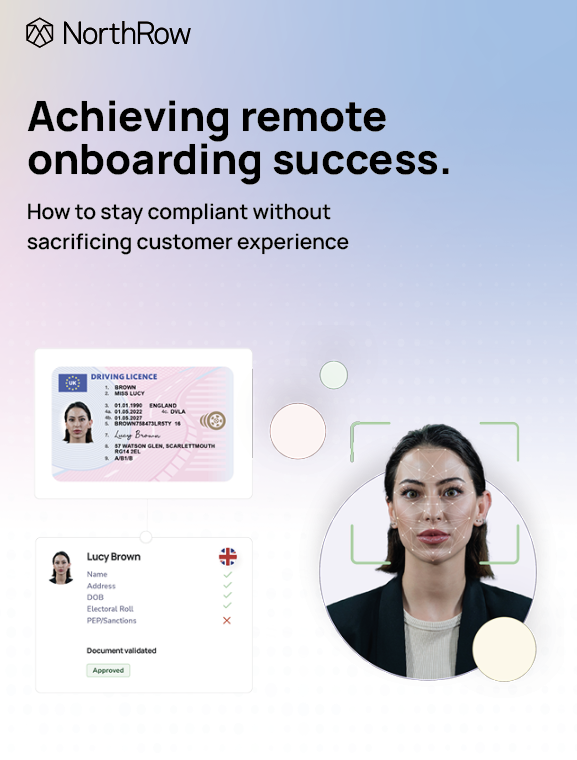In the highly regulated lending industry, compliance with Know Your Business (KYB) requirements is both a legal necessity and a strategic imperative. For senior compliance professionals in regulated lending firms, the challenge lies in balancing stringent regulatory requirements with an efficient onboarding process.
Regulatory bodies such as the Financial Conduct Authority (FCA) in the UK mandate strict KYB compliance processes. Non-compliance can result in significant penalties, reputational damage, and operational disruptions. Therefore, it is essential for senior compliance managers to adopt best practices and leverage technology to enhance the efficiency and effectiveness of KYB processes.
This article takes a look into some of the key challenges of KYB compliance and shares some insights on how to streamline the due diligence process, consolidate data silos, and where compliance teams can benefit from technology like NorthRow’s WorkStation.
The challenges of global KYB compliance
KYB compliance is fraught with a multitude of challenges that lending firms must navigate to ensure they meet stringent regulatory standards.
Unmanageable data silos
One of the primary hurdles is the sheer complexity and volume of documentation required for verifying business clients. This is especially daunting when dealing with international entities that operate under different regulatory regimes, making it difficult to standardise the due diligence process. For example, verifying the legitimacy of a foreign company may involve navigating foreign languages, different business registration standards, and diverse financial reporting practices.
Moreover, data silos increase the risk of incomplete or outdated information being used for decision-making processes, potentially leading to regulatory non-compliance or exposure to financial crime risks. Compliance teams often face difficulties in verifying the accuracy and reliability of data when it is stored in disparate systems, which can undermine efforts to identify and mitigate financial risks effectively.
Relying on manual processes
The reliance on manual processes in many firms further exacerbates these challenges. Manual verification is not only time-consuming but also prone to human error, leading to potential oversights and inconsistencies in the KYB process. This can result in significant risks, including exposure to fraudulent entities and regulatory penalties for non-compliance.
In many firms, KYB checks still involve manually collecting, reviewing, and cross-referencing information such as business registration certificates, financial statements, and identification documents. This labour-intensive process is often slow and inefficient, delaying client onboarding and frustrating both compliance teams and potential clients.
What’s more, the manual process can struggle to keep up with the volume of data and the pace at which business operations grow and client risk profiles change, making it difficult to maintain up-to-date and accurate records.
Verifying UBOs
The complexity of KYB checks is only compounded by the need to identify and verify ultimate beneficial owners (UBOs), who may use complex corporate structures to obscure their identities where bad actors are involved. The opacity of beneficial ownership can significantly hamper the KYB process, as firms must dig through layers of subsidiaries and shell companies to determine who ultimately controls an entity.
🔗 How to verify Ultimate Beneficial Owners (UBOs)
Changing regulatory requirements
Another significant challenge is the constantly evolving regulatory environment. Regulatory bodies frequently update KYB requirements to address emerging risks, such as new methods of money laundering or the financing of terrorism. Keeping up with these changes requires continuous monitoring and swift adaptation of compliance processes, which can strain resources, particularly for smaller firms with limited compliance teams.
Maintaining customer satisfaction
Furthermore, the integration of KYB checks into existing business processes without causing significant delays or disrupting client onboarding is another critical challenge. Lengthy verification procedures can frustrate potential clients and hamper business growth, creating the need for a delicate balance between thorough compliance and efficiency.
🔗 How to conduct thorough KYB checks without compromising customer experience
Best practices for streamlining global KYB
Use tech for KYB processes
Leveraging technology is perhaps the most critical component of streamlining KYB onboarding processes. Automated verification platforms can drastically reduce the time and effort required for KYB checks by providing real-time access to global business databases and facilitating secure document verification.
WorkStation, for example, can analyse large volumes of data quickly and accurately, identifying potential risks that might be overlooked in manual processes. By integrating such digital solutions, firms can achieve more consistent and reliable KYB outcomes.
Taking a risk-based approach
Implementing a risk-based approach to KYB compliance is another best practice that can improve efficiency and make the onboarding process simpler for both compliance teams and corporate clients. This typically involves categorising clients based on their risk profiles and tailoring the depth of due diligence accordingly.
High-risk clients warrant more extensive checks, while low-risk clients can be processed more swiftly with standard verification procedures. This prioritisation ensures that resources are allocated effectively, focusing on areas where the risk of non-compliance is greatest.
Bring data silos into one platform to minimise risk
Integrating data from multiple sources into a single platform is crucial for KYB compliance in lending firms because it ensures consistency and accuracy of information, providing a holistic view of customers and businesses.
Taking a centralised approach with a single compliance solution streamlines processes, enhances risk management, and facilitates more effective decision-making. Armed with a 360-degree, real-time view of corporate clients and risk profiles, firms can meet stringent regulatory requirements by maintaining comprehensive and auditable records of due diligence activities, minimising operational risks and ensuring compliance with KYB regulations.
Building a culture of compliance
Fostering a culture of compliance within your organisation is essential for the success of KYB processes. This involves promoting awareness and understanding of KYB requirements across all levels of the firm, from senior management to front-line staff.
Encouraging a proactive approach to compliance, where employees are vigilant and responsive to potential risks, can significantly enhance the effectiveness of KYB efforts. Leadership should demonstrate a strong commitment to compliance, providing the necessary resources and support to ensure that KYB processes are implemented effectively.







